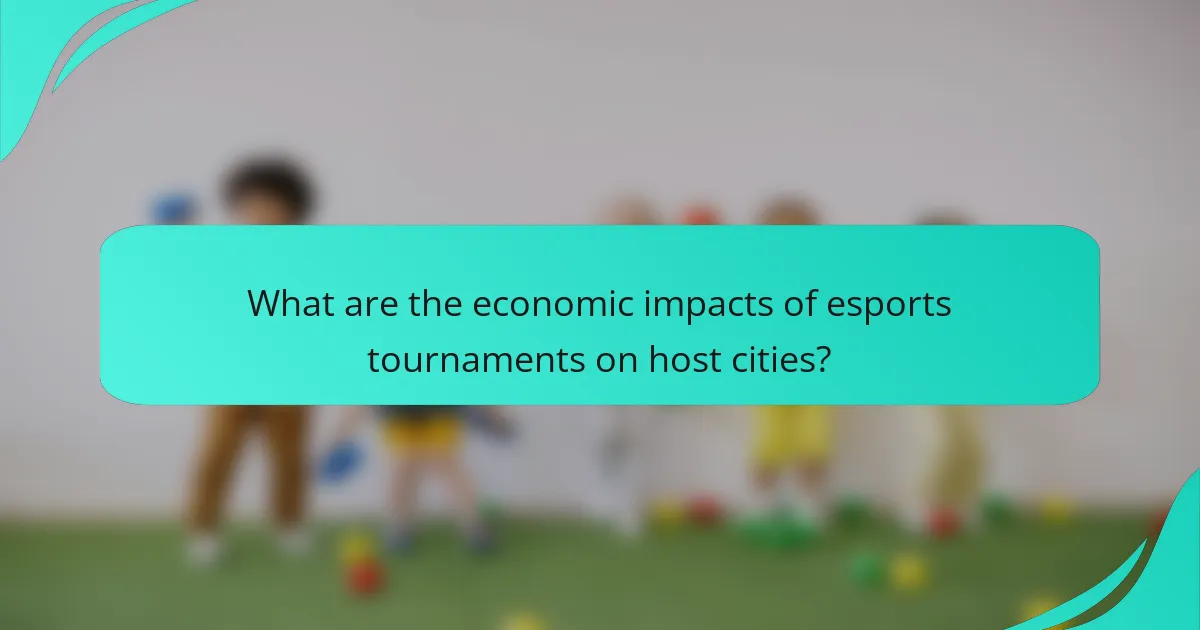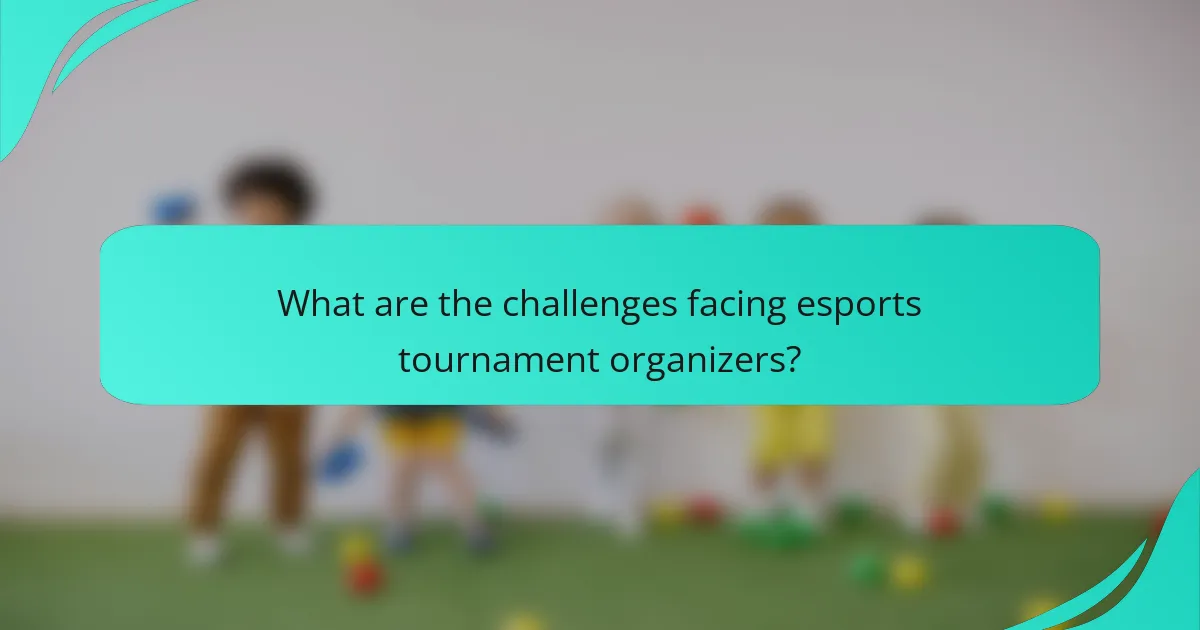The growth of esports is largely driven by major tournaments that attract vast audiences and significant sponsorship investments. Events like The International and the League of Legends World Championship not only showcase elite talent but also enhance the industry’s visibility and revenue potential. As these tournaments continue to evolve, they play a crucial role in shaping player careers and fostering community engagement within the gaming landscape.

How are major esports tournaments driving growth in North America?
Major esports tournaments are significantly boosting growth in North America by attracting large audiences and increasing investment from sponsors. These events not only enhance visibility for the esports industry but also create new opportunities for revenue generation and community engagement.
Increased viewership and sponsorship deals
The rise in viewership for major esports tournaments has been remarkable, with millions tuning in to watch live streams and broadcasts. This surge in audience numbers has led to lucrative sponsorship deals, as brands seek to connect with the engaged and diverse gaming demographic.
For instance, major tournaments like the League of Legends World Championship and The International for Dota 2 have drawn viewership figures in the millions, prompting companies to invest heavily in advertising and partnerships. These sponsorships often include multi-million dollar agreements, significantly impacting the financial landscape of esports.
Expansion of esports arenas and events
As interest in esports grows, so does the number of dedicated arenas and live events across North America. Cities are increasingly hosting large-scale tournaments in venues that can accommodate thousands of fans, enhancing the live experience and fostering community engagement.
Examples include the Staples Center in Los Angeles and the Barclays Center in New York, which have hosted major esports competitions. This expansion not only provides a platform for players and teams but also stimulates local economies through tourism and job creation.
Rise of collegiate esports programs
Collegiate esports programs are gaining traction in North America, with many universities establishing teams and offering scholarships. This trend is helping to legitimize esports as a competitive and educational pursuit, attracting students who are passionate about gaming.
Schools like the University of California, Irvine, and Harrisburg University have developed robust esports programs, providing students with opportunities to compete at high levels. These initiatives not only promote skill development but also prepare students for careers in the growing esports industry.

What are the key tournaments shaping the esports landscape?
Key tournaments like The International, the League of Legends World Championship, and CS:GO Major Championships significantly influence the esports landscape by showcasing top-tier talent and driving viewer engagement. These events not only elevate the games they represent but also contribute to the overall growth of the esports industry through sponsorships, media rights, and fan participation.
The International (Dota 2)
The International is the premier tournament for Dota 2, featuring the best teams from around the world competing for a multi-million dollar prize pool. It is renowned for its crowdfunded prize money, which can reach tens of millions of USD, reflecting the community’s investment in the event.
Held annually, The International typically takes place in the summer and attracts millions of viewers globally. The tournament format includes a group stage followed by a knockout stage, ensuring that only the top teams advance to compete for the championship title.
League of Legends World Championship
The League of Legends World Championship is the pinnacle of competitive League of Legends, drawing in massive audiences and featuring teams from various regions. The tournament usually offers a prize pool in the millions of USD and is held in the fall, culminating in a grand final that showcases the best players in the game.
Teams qualify through regional leagues, and the event is structured in a way that emphasizes both group stages and elimination rounds. This format not only heightens the competition but also engages fans through interactive viewing experiences and community events.
CS:GO Major Championships
CS:GO Major Championships are the most prestigious tournaments in Counter-Strike: Global Offensive, featuring top teams competing for significant prize money and ranking points. These events are typically held several times a year and are known for their high stakes and intense competition.
Each Major is organized by Valve and includes a series of qualifiers leading up to the main event. The tournament format often consists of a group stage followed by a playoff bracket, allowing for thrilling matchups and upsets that keep fans on the edge of their seats.

How do esports tournaments impact player careers?
Esports tournaments significantly influence player careers by providing financial rewards, enhancing visibility, and fostering professional growth. These events can elevate a player’s status, leading to various opportunities that can shape their future in the gaming industry.
Increased earning potential through prize pools
Prize pools in esports tournaments can range from thousands to millions of dollars, depending on the game’s popularity and the event’s scale. Players can earn substantial sums through placement in competitions, with top-tier players often making six-figure incomes annually from tournament winnings alone.
Additionally, many tournaments offer bonuses for specific achievements, such as the most kills or best plays, further increasing earning potential. Players should focus on participating in high-stakes tournaments to maximize their financial rewards.
Opportunities for brand partnerships
Esports tournaments attract significant attention from brands looking to reach a young, engaged audience. Successful players often attract sponsorship deals from gaming companies, tech brands, and lifestyle products, which can provide a steady income stream beyond tournament winnings.
Building a personal brand through social media and streaming platforms can enhance these partnership opportunities. Players should actively engage with their audience and showcase their skills to attract potential sponsors.
Career longevity and skill development
Participating in esports tournaments helps players refine their skills and adapt to competitive environments, which is crucial for long-term success. Regular competition allows players to learn from their experiences, develop strategies, and stay updated with game changes.
Moreover, the exposure gained from tournaments can lead to coaching or analyst roles in the industry, extending a player’s career beyond active competition. Players should consider diversifying their skills and exploring various roles within esports to ensure career longevity.

What are the economic impacts of esports tournaments on host cities?
Esports tournaments significantly boost the economies of host cities through increased tourism, job creation, and local business revenue. These events attract thousands of visitors, leading to a ripple effect on various sectors within the local economy.
Boost in local tourism and hospitality
Esports tournaments draw large crowds, often bringing in fans from different regions and countries. This influx of visitors leads to higher occupancy rates in hotels, increased bookings at restaurants, and more spending at local attractions.
For example, a major tournament can fill hotels to capacity, leading to a surge in demand for services such as transportation and entertainment. Cities hosting these events often see a temporary spike in tourism revenue, which can be a significant boost for the local economy.
Job creation in event management
The organization of esports tournaments requires a diverse range of skills, leading to job creation in event management. Positions may include event coordinators, technical staff, security personnel, and hospitality workers, all of which contribute to the local job market.
Additionally, many of these roles are temporary, providing opportunities for freelance workers and students looking for short-term employment. This can help reduce local unemployment rates, even if just for the duration of the event.
Increased local business revenue
Local businesses benefit directly from the increased foot traffic generated by esports tournaments. Retail shops, food vendors, and entertainment venues often see a surge in sales during these events, as attendees look for places to eat, shop, and socialize.
Moreover, sponsorship deals and partnerships with local businesses can further enhance revenue streams. For instance, restaurants may offer special menus or discounts for tournament attendees, creating a win-win situation that boosts both sales and customer satisfaction.

What are the challenges facing esports tournament organizers?
Esports tournament organizers face several challenges that can impact the success of their events. Key issues include logistical and technical problems, as well as regulatory compliance and legal hurdles that must be navigated to ensure smooth operations.
Logistical and technical issues
Logistical challenges often involve venue selection, equipment setup, and scheduling conflicts. Organizers must ensure that venues can accommodate the expected audience and provide the necessary infrastructure, such as high-speed internet and power supply.
Technical issues can arise from the complexity of gaming equipment and software. Organizers should conduct thorough testing of all systems before the event to minimize downtime. Having a dedicated technical support team on-site can help address any issues quickly.
Regulatory compliance and legal hurdles
Regulatory compliance is crucial for esports tournaments, especially regarding age restrictions and broadcasting rights. Organizers must be aware of local laws and regulations that govern gaming events, which can vary significantly by region.
Legal hurdles may include securing licenses for games, negotiating contracts with sponsors, and ensuring that all participants adhere to the rules. It’s advisable to consult with legal experts familiar with esports to navigate these complexities effectively.
